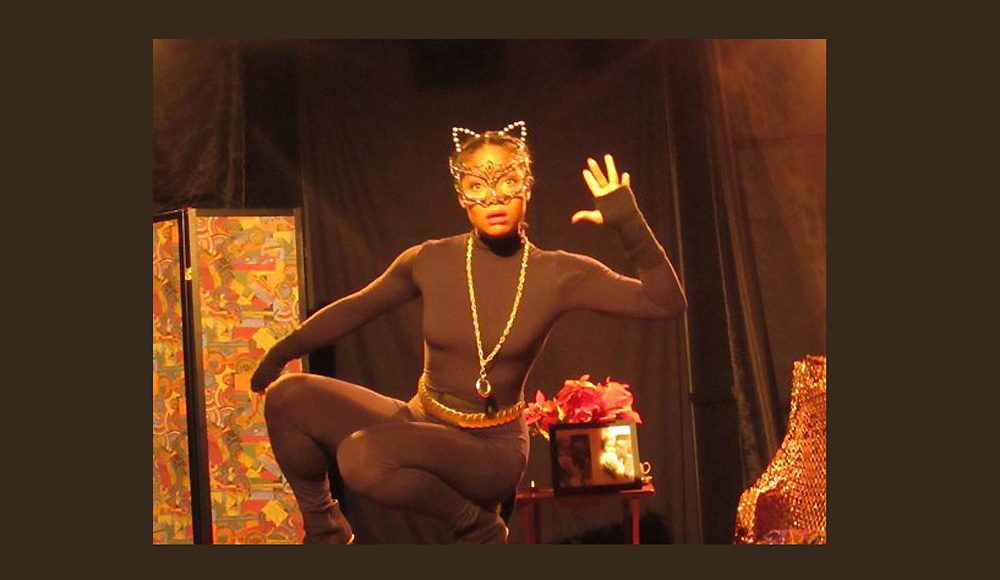Today, I would imagine, the name Eartha Kitt is primarily associated with the classic TV series Batman ** on which she appeared as the second incarnation of the feline villainess Catwoman, after Julie Newmar retired her whiskers.
To one of my generation, Eartha Kitt was a highly volatile and exceedingly sensual presence at a time when most of America’s cultural sex symbols were both very white and typified by the voluptuous mounds and curves the likes of Jayne Mansfield, Marilyn Monroe and Gina Lollobrigida.
Kitt possessed a succulent eroticism claiming Cherokee and African ancestry with some German tossed into the mix, and whereas the sexuality of the others came at you like a platoon of Rommel’s Panzers racing towards Dunkirk, Kitt’s sensuality emanated a surreptitious sizzle befitting her dancer’s background.
As a Texan friend of mine exclaimed after we saw her perform at the Aquarius Theater in Hollywood, “Dawg! Only thing I ever saw more like that had a rattle on its tail!”
Kitt’s sexuality had a fierce defiance about it, which made it all the more alluring, and whereas Mansfield, Monroe and Lollobrigida struggled for public validation that there was more to them than just their surface persona, there was never any question that Kitt’s petite presence held a depth few could boast.
She and Harry Belafonte were among the very first to use their celebrity to raise the consciousness of the Civil Rights movement and during the March on Washington she was with King.
But her finest hour was in 1968, when she appeared at the White House as the invited guest of President Johnson and his wife Lady Bird.
Body bags were arriving daily from Viet Nam, but the war remained a topic avoided in polite company.
Kitt, however, prided herself on being anything but “polite company,” so before the president, the first lady and America she gave voice to the failure of that war.
“The children of America are not rebelling for no reason.”
For her courage and honesty she was exiled from this country for nearly a decade.
And from some she earned their undying respect.
Ashlee Olivia Jones’ one-woman show E.A.R.T.H.A. starts off on a high note, literally and figuratively with Kitt, whom she does bear a striking resemblance to, making a grand entrance in a blood red turban and white silk robe descending a staircase to grace us mere mortals with her presence.
From that point, however, a good portion of the show simply does not work, impaired, sadly, by self-inflicted wounds.
First there is the narrative, or rather lack thereof.
We are given information about Kitt’s life, but this information remains only that.
Life is a hodgepodge of facts.
In life those “facts” can remain in isolation, as nothing requires you to connect them.
This is not the case in drama.
Here the amalgamation of “facts” requires fusion to achieve a narrative arc.
With that fusion you have a “story.”
Without it you have a slide show, at best.
Jones—who wrote the script—provides herself with no firm story, instead there are only moments that meander from song to song, which would be fine if Jones were striving only to recreate Kitt’s night club act.
The other problem is in Jones’ excessive off stage costume changes.
I understand Jones was attempting to capture some of Kitt’s glamour, but the audience was left in the dark too often and too long, with each disappearance breaking her hold on them.
 Despite these stumbling blocks, the show had one huge Ace in its hand, and that is Jones herself.
Despite these stumbling blocks, the show had one huge Ace in its hand, and that is Jones herself.
She gave an exceptional performance of an exceptional performer; no small feat there.
This and a well-crafted, if unaccredited, sound design allows one to forgive the production’s defects.
For the performances a Gold Medal.
** Which to correct the program note ran from 1966-1968 and not during the 1950s.
♦ ♦ ♦
For additional information: ashleeoliviajones.weebly.com/eartha
Thank you for Supporting the Voices of The TVolution
Like us on Facebook and Please Subscribe







Steve Schlich | August 12, 2017
|
As a child of the Vietnam war era, I remember very well the ostracism suffered by professionals who opposed the war early on. Kitt had real courage in addition to all that talent and sensuality.